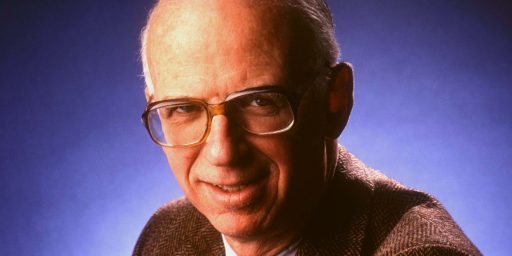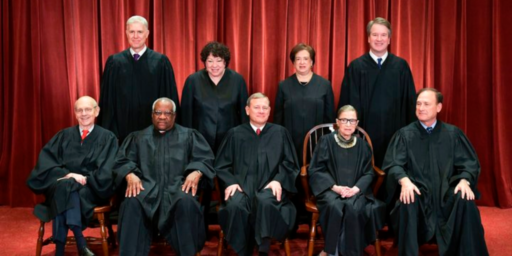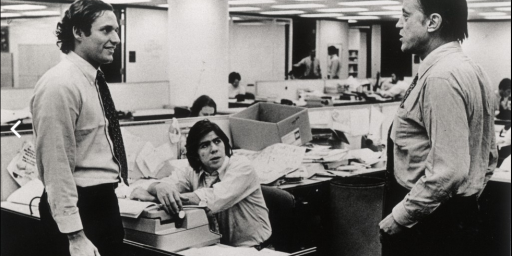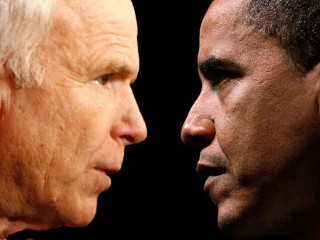GWB = FDR?
Stephen said today’s David Broder column was a must-read. Building on a Jonathan Rauch piece in National Journal, Broder notes the surprising radicalness of Bush’s policy agenda and says it’s comparable to the boldness of FDR’s:
Instead, FDR created the modern welfare state and forged the New Deal political coalition that largely dominated American politics from 1932 to 1968. Bush, Rauch argues, is pressing forward major structural changes in both foreign and domestic policy, revising the doctrine and reputation of conservatism and aiming for long-term political dominance by the GOP.
Roosevelt made his changes under the spur of the Great Depression and World War II. Bush has the impetus of 9/11 to thank for the doctrine of preemptive wars, used to justify the attack on Iraq, and for the creation of the Homeland Security Department, one of the biggest restructurings of government since the New Deal. But many of Bush’s other innovations, such as his sweeping tax changes, his education initiative and the pending expansion of Medicare to include prescription drugs, are rooted in nothing other than his own sense of what the times require.
The real similarity, Rauch says, is the daring Bush and FDR both displayed — and the size of the policy and political gambles both were willing to take.
I have commented previously on the surprise in seeing how Bush, who campaigned as a nice guy who would calm the roiled waters of Washington but not upset the status quo, has defied the basic assumptions about everything from the role of the federal government in education (making it much more intrusive) to the conduct of foreign policy (making it much less deferential to the views of other nations). The comparison Rauch makes to FDR does not strike me as being overblown.
Like Stephen, I like the new direction in foreign policy but am much less sure of the domestic agenda. The huge spending and continued erosion of the power of the States is not something one expects to see from a conservative Republican president. It is, however, almost certainly what the vast majority of Americans want.
While it’s often overlooked, FDR was an incredibly polarizing figure in his day. He did lead a Democratic realignment, however. The party dominated Congress from 1933-1995 and held the White House for all but eight years from 1933-1969–and it took Dwight Eisenhower, a hero in FDR’s war who could easily have run as a Democrat to interrupt that string. If the economy continues to heat up, it’s not inconceivable that Bush could effect a similar realignment.






I think that is a fair summation you made, James. It is the alignment the Republicans thought was due them in the 1990’s but never quite materialized thanks to Clinton co-opting many of their basic policies. I have long thought the hatred for Clinton attributable less to actual policy differences and more to resentment that he was there at all.
Yeah, this is a bit overdrawn. I don’t see any “major” policy realignment on the domestic front. Even one of Bush’s main innovations — the Faith-Based Initiative — is not that good of an idea and is rooted more in watered-down corporatism than freeing up the energies of the philanthropic markets. I’m also a bit confused about how Bush has made the federal government less intrusive in education. He has only recently revisited the vouchers issue and there hasn’t been much movement there. (Note: There is movement in DC, but that is due to the mayor, not the prez.)
And as for foreign policy, I don’t see much difference from the Reagan years. And there was quite a bit of deference to the views of other nations in that it took a relatively long time to get into Iraq, and his Israel policy is not all that innovative (and seems too deferential to the Arab nations – at least for my tastes).
Apropos of nothing, really, I think it’s interesting to point out that while FDR did create a Democratic coalition, he didn’t create a long lasting liberal coalition. The southern Democrats were all conservatives, and after four years of the New Deal the normal order restored itself and Congress was majority conservative (though not majority Republican).
Not sure how this affects W. America has always been fundamentally conservative, with only two brief legislative exceptions in the past 70 years. This ought to make his job easier, but it might also lead to overreach. Hard to say.
JL: No, that’s MORE intrusive in education. All the testing and whatnot = more, not less.
Kevin: Good point on the Southern Dems. Indeed, arguably FDR drove them away, albeit slowly. Of course, there are a good number of, mainly northern, liberal Republicans out there, too.
I guess conservative is a relative thing. While I think the religious subculture makes the culture socially conservative, there has been a steady “gimme gimme gimme” drumbeat building for decades. People want small government and low taxes–but they want lots of goodies.
Yep, you’re right. I forgot about the whole federlism/local control thing.
W. and FDR are probably equally popular amongst those who truly believe in small government.
Indeed. Fortunately for Bush, his stance on the war as compared with that of his likely rivals makes him popular with his base.